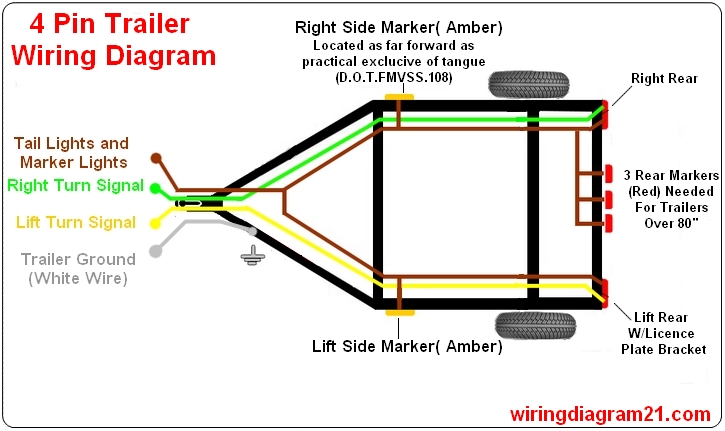Trailer Hitch Wiring Mysteries: Cracking the 4-Pin Code
Imagine this: You’re all set for an epic road trip, trailer hitched and ready to roll. But wait – are your trailer lights even working? That tiny 4-pin connector holds the key to a safe and legal journey. What if there’s a problem lurking within its plastic shell? Don’t panic! Understanding the secrets of the 4-pin trailer hitch plug is easier than you think.
Testing a 4-pin trailer hitch plug isn’t just about avoiding a ticket. It’s about ensuring the safety of everyone on the road. A faulty connection can mean non-functional brake lights, turn signals, or tail lights, increasing the risk of accidents, especially at night or in poor visibility. Knowing how to verify your connection is working correctly is a fundamental part of responsible trailer ownership.
The 4-pin connector, a seemingly simple arrangement of wires and prongs, has become the standard for light-duty trailers. Its widespread adoption stems from its ease of use and relatively straightforward wiring scheme. While larger trailers often utilize more complex connectors (like 5-pin, 6-pin, or 7-pin configurations), the trusty 4-pin handles the essential lighting functions for smaller trailers, boat trailers, and utility trailers.
One of the main issues when dealing with 4-pin connectors is corrosion. Exposed to the elements, these plugs can become oxidized or rusty, disrupting the electrical connection. Another common problem is incorrect wiring. A simple mix-up during installation can lead to frustrating troubleshooting sessions. And of course, sometimes the issue isn't the plug itself, but a blown fuse or a faulty bulb on the trailer.
So, how do you decipher these electrical riddles? There are several effective methods for checking your 4-pin trailer hitch plug. You can use a simple circuit tester, a dedicated trailer tester, or even a test light. Each approach provides a different level of insight into the functionality of your connection. We’ll delve into the details of each method later on.
Benefit 1: Safety. Ensuring your trailer lights function correctly dramatically improves safety by signaling your intentions to other drivers, reducing the risk of accidents.
Benefit 2: Legality. Operating a trailer with faulty lights is illegal in most jurisdictions. Testing your connection helps you avoid fines and legal trouble.
Benefit 3: Peace of Mind. Knowing your trailer lights are working properly gives you peace of mind, allowing you to focus on enjoying your trip.
Step-by-Step Guide to Testing a 4-Pin Trailer Hitch Plug with a Tester:
1. Connect the tester to the 4-pin connector on your tow vehicle.
2. Turn on the vehicle's lights (headlights, turn signals, and brake lights).
3. Observe the corresponding indicators on the tester. They should illuminate to match the activated function.
Checklist:
Running Lights - Check
Left Turn Signal - Check
Right Turn Signal - Check
Brake Lights - Check
Advantages and Disadvantages of Testing Methods
| Method | Advantages | Disadvantages |
|---|---|---|
| Circuit Tester | Simple, inexpensive | May not identify all issues |
| Trailer Tester | Comprehensive diagnostics | More expensive |
| Test Light | Directly tests circuits | Requires more technical knowledge |
Best Practices:
1. Regularly inspect the plug for corrosion.
2. Use dielectric grease to protect the connection.
3. Securely fasten the plug to prevent damage.
4. Consult a wiring diagram if you experience problems.
5. Test the connection before each trip.
Real-World Examples: (Provide 5 specific scenarios where testing is crucial – e.g., before a long road trip, after submerging a boat trailer, etc.)
Challenges and Solutions: (Provide 5 common challenges, such as no lights, dim lights, etc., and the corresponding solutions.)
FAQ: (Include 8 common questions about 4-pin trailer hitch testing and provide concise answers.)
Tips and Tricks: Use a continuity tester to verify the wiring within the trailer itself. Carry spare fuses for both the vehicle and the trailer.
In conclusion, mastering the art of testing a 4-pin trailer hitch plug is a vital skill for any trailer owner. From ensuring your safety on the road to avoiding legal hassles, the benefits of a properly functioning connection are undeniable. By following the simple steps outlined in this guide, and being prepared for common challenges, you can confidently hit the road, knowing your trailer lights are communicating effectively. Take the time to test your connection regularly, and remember that a little preventative maintenance can go a long way in ensuring trouble-free towing. Don't wait until you're on the side of the road with a non-functional trailer – take control of your trailer lighting, and enjoy a safe and worry-free journey.
Pre marital health checks understanding hiv and thalassemia tests
Gypsy rose blanchards release exploring life after incarceration
Unveiling the enigma who is dr wong ming sunway














